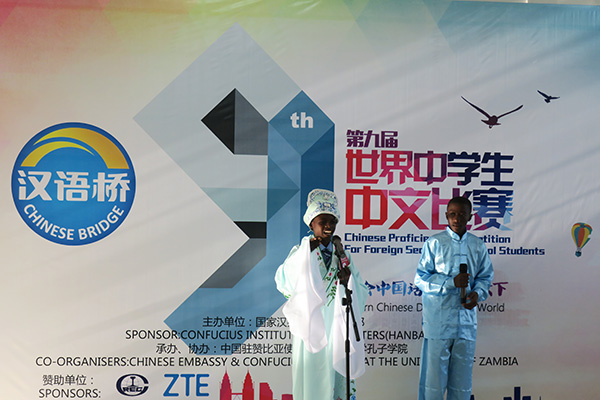Zambia students bridge culture in Chinese competition
Laughter and applause filled the auditorium as teachers, students and guests were entertained by secondary students from Zambia during the Chinese Proficiency Competition for Foreign Secondary Schools.
Hosted by the Confucius Institute at the University of Zambia in Lusaka, the Bridge Competition that was taking place for the second time in the southern African country saw 12 students battle it out for an opportunity to present their country in the ninth annual edition of the global event.

They were judged according to their proficiency in speech, general knowledge and talent show.
Sixteen-year old Paul Kapasa and Prestly Mutambala, both from Marisa Secondary School, won the first price respectively. They will represent the country in Beijing later this year.
According to Mutambala, he wants to bridge the cultural divide between Africa and China. "Communication flattens barriers that exist between people and counties. I want to be the go-between," said the student whose speech was about the importance of learning Mandarin.
The school is among 15 others that have been undertaking the studies for two years now. However, more will join the fold once a law is enacted that will see the language officially incorporated in the Zambian school curriculum said Sande Ngalande, the director of the Confucius Institute at the University of Zambia.
"We have successfully undertaken a pilot project," he confirmed adding that the introduction will see Zambian students learn Mandarin as the third foreign language after French and Portuguese.
"The need for this language is enormous considering the strong and growing relationship China has with our country. This offers more opportunities for our students in terms of employment and growth," said the don.
Housed under the School of Humanities, the department is developing human capacity to prepare for the roll out of the classes in schools. Already, there is an ongoing degree program.
"We have a partnership agreement with Hebei University of Economics and Business located in Shijiazhuang, Hebei Province that could see our students who have completed two years of study go there for another two years to refine their speaking and writing. In twelve years, we hope to have developed PhD programs here and in Mulungushi University in Kabwe," said Dr. Ngalande.
In his speech, the Chinese Embassy in Zambia Political Counselor Chen Shijie said that learning Chinese promotes the two cultures and expands students' knowledge and experience.
"We have witnessed today great enthusiasm by the students to learn Chinese. This momentum is growing as there are 16 examination institutes in the country. 7000 students are currently learning the language," he said.
He asserted that the need for mandarin speakers is increasing steadily since Zambia is responding positively recommendations made during the Forum on China-Africa Cooperation summit held in Johannesburg last year. "The need for such classes will broaden as more Chinese invest in Zambia," he said.
Sally
Tel: 0086-571-88165697
Email:eduunion@cuecc.com
Skype:studycn001
QQ:2853662503
WeChat:CUECC2003
News&Opinion
 more
more- OFFICIAL LAUNCH OF BFSU ACADEMY OF REGIONAL AND ...
- G20: Hangzhou wins world's attention
- How To Buy Happiness - The Investment Of Travel
- Goodbye, Rio; hello, China
- 2016 Yunnan-Thailand Education cooperation and e...
- Nice to meet you---你好中文!
- China sending largest-ever team to Rio
- Going to a top university ’no guarantee of getti...
Policy&Laws
How to Get one Job in China---Beijing policy
A foreigner, right, shows his job application form at a human resour...
Guilin to offer 72-hour visa-free stays
GUILIN - The city of Guilin in South China's Guangxi Zhuang autonomo...
further strengthening the visa regulation of int...
After the promulgation of new Immigration Control Act in China, Entr...





 print
print  email
email  Favorite
Favorite  Transtlate
Transtlate 








